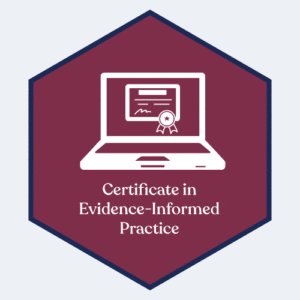Cultivating critical expertise: Balancing teacher agency and evidence-informed practice in schools
Written by: Andrew Jones

7 min read
ANDREW B JONES, THE REACH FREE SCHOOL, UK; THE OPEN UNIVERSITY, UK
Introduction
The evolving landscape of educational ‘best practice’ emphasises evidence-informed practice (EIP), particularly in its scientific form, for enhancing teaching and learning outcomes (Perry et al., 2021). However, balancing EIP with teacher agency presents challenges. Proponents of EIP argue that teaching should align with research evidence, which is often driven by a ‘what works’ agenda, largely based on the ‘science of learning’ (Weinstein et al., 2018), but concerns linger about top-down implementation that restricts professional autonomy and bypasses the complexities of individual classrooms and diverse learners (Simmie et al., 2024). In response, this paper argues that cultivating critical expertise necessitates a nuanced approach that advocates the importance of EIP while acknowledging teachers’ freedom to choose which strategies and interventions work best for their classes and student
Join us or sign in now to view the rest of this page
You're viewing this site as a guest, which only allows you to view a limited amount of content.
To view this page and get access to all our resources, join the Chartered College of Teaching (it's free for trainee teachers and half price for NQTs) or log in if you're already a member.
- Anwer M and Reiss M (2023) Linking research and practice in education: The views of expert researchers in the field. Journal of Education for Teaching 49(2): 326–340.
- Ball SJ (2021) The Education Debate, 4th ed. Bristol: Polity Press.
- Biesta G (2023) The integrity of education and the future of educational studies. British Journal of Educational Studies 71(5): 493–515.
- Cochran-Smith M and Lytle S (2009) Inquiry as Stance: Practitioner Research for the Next Generation. New York: Teachers College Press.
- Coe R and Kime S (2019) Teacher Research: Exploring its Relationship to Professional Knowledge and Professional Development. London: Routledge.
- Department for Education (DfE) (2024) Initial teacher training and early career framework. Available at: https://assets.publishing.service.gov.uk/media/661d24ac08c3be25cfbd3e61/Initial_Teacher_Training_and_Early_Career_Framework.pdf (accessed 20 June 2024).
- Dunlosky J (2013) Strengthening the student toolbox. The American Educator 37(3): 12–21.
- Emirbayer M and Mische A (1998) What is agency? American Journal of Sociology 103(4): 962–1023.
- Eteläpelto A, Vähäsantanen K, Hökkä P et al. (2013) What is agency? Conceptualizing professional agency at work. Educational Research Review 10: 45–65.
- Fullan M, Rincón-Gallardo S and Hargreaves A (2015) Professional capital as accountability. Education Policy Analysis Archives 23: 15. DOI: 10.14507/epaa.v23.1998.
- Hargreaves DH (1996) Teaching as a Research Based Profession: Possibilities and Prospects. London: Teacher Training Agency.
- Jones G and Hayward J (2000) Goodbye chalk & talk. The Philosophers’ Magazine 10(10): 13–14.
- Leithwood K and Levin B (2011) Understanding how leadership influences student learning. In: Järvelä S (ed) Social and emotional aspects of learning. Oxford: Academic Press, pp. 251–256.
- Muijs D (2019) Improving curriculum evaluation in educational inspection. Cambridge Journal of Education 49(3): 306–321.
- Neelen M and Kirschner PA (2020) Educational research in the age of evidence-informed practice. Educational Researcher 49(2): 67–72.
- Perry T, Lea R, Rübner Jørgensen C et al. (2021) Cognitive science approaches in the classroom: A review of the evidence. Education Endowment Foundation. Available at: https://d2tic4wvo1iusb.cloudfront.net/production/documents/guidance/Cognitive_science_approaches_in_the_classroom_-_A_review_of_the_evidence.pdf?v=1718788131 (accessed 19 June 2024).
- Priestley M, Biesta G and Robinson S (2015) Teacher agency: What is it and why does it matter? In: Kneyber R and Evers J (eds) Flip the System: Changing Education from the Bottom Up. London: Routledge, pp. 134–148.
- Rosenshine B (2012) Principles of instruction. American Educator 36(1): 12–19, 39.
- Simmie GM, O’Meara N, Forster A et al. (2024) Towards a model of teachers’ continuing professional development (CPD): A border crossing journey with embedded contradictions, ethical dilemmas and transformative possibilities. Professional Development in Education 50(1): 46–58.
- Weinstein Y, Madan CR and Sumeracki MA (2018) Teaching the science of learning. Cognitive Research 3: 2. DOI: 10.1186/s41235-017-0087-y.
- Wrigley T and McCusker S (2019) Evidence-based teaching: A simple view of ‘science’. Educational Research and Evaluation 25(1–2): 110–126.
0
0
votes
Please Rate this content
Subscribe
Please login to comment
0 Comments
Oldest
Newest
Most Voted
Inline Feedbacks
View all comments











